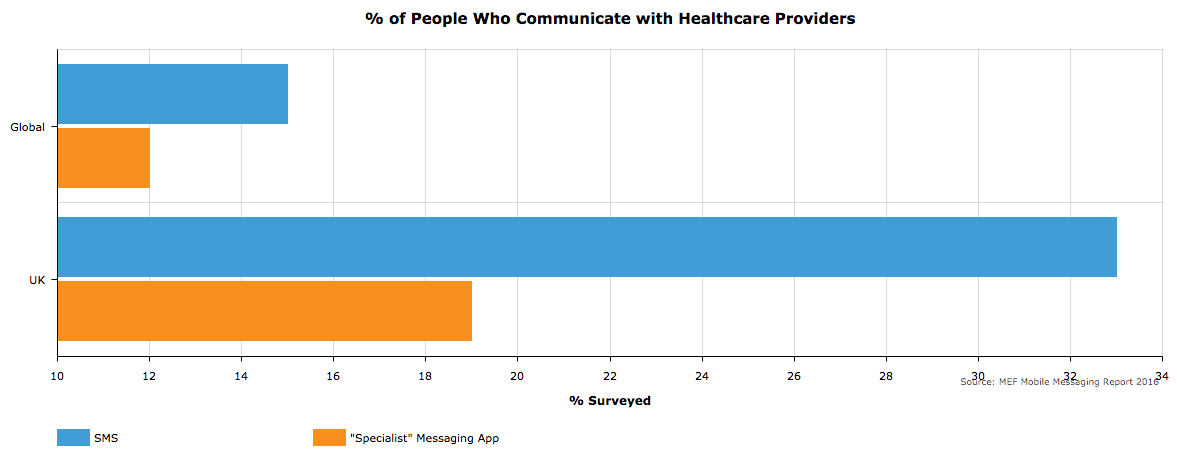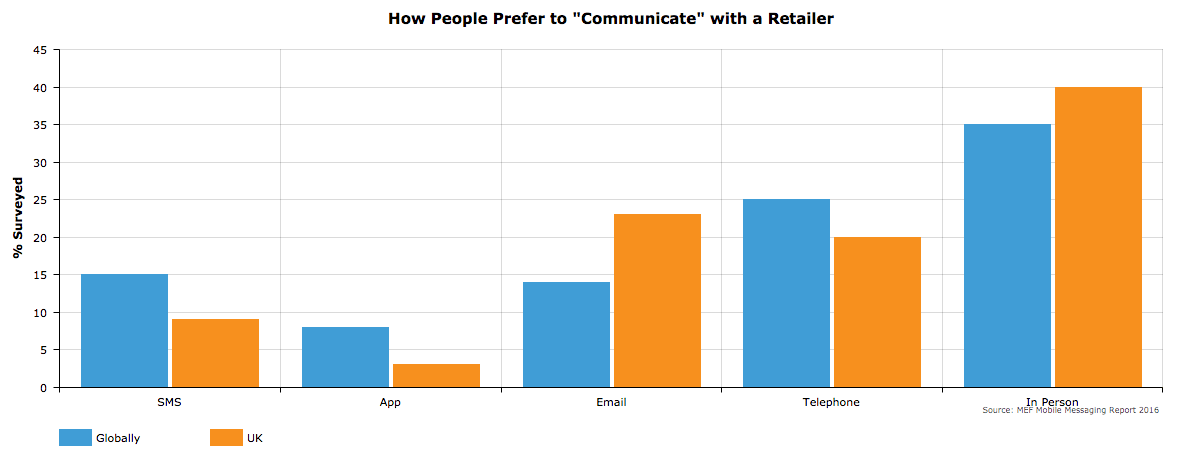5 Facts Your Business Should Know About A2P SMS Messaging

In my last blog, I highlighted three facts regarding how Brits feel about SMS messaging. In this post, I’m going to use the same source, the Mobile Ecosystem Forum (MEF) Mobile Messaging Report 2016, but focus on what businesses need to know about SMS usage in the UK.
Much of the data in the MEF report is about businesses using application-to-person, or A2P, messaging. The questions don’t specifically ask if the messages are A2P, but the report assumes they are. And I think for the most part they’re right, but I’ll get to that in the details for each fact.
What Sectors Use SMS
Many people are aware of SMS marketing, but did you know almost every business sector uses it? The amount varies by sector, with the banking or financial industry being the most prolific (if you can be prolific in 160 characters).
The survey also asked people if they’ve communicated with businesses via a messaging app rather than SMS (think Facebook, WhatsApp, Snapchat, etc). The chart below shows the percentages of each sector and how much each used SMS or Apps for A2P communications over the last 12 months.
It’s easy to see the spike for banks in the chart. And if you look closely, you’ll see that SMS wins in every sector. The last bars on the chart are for those that never sent or received messages. Only 24% of people have never communicated via SMS, while 35% have not used a messaging app.
SMS and Healthcare in the UK
The UK is “enthusiastic” about using SMS for communicating with healthcare providers according to the report. Out of all the countries surveyed, it had the highest percentage of SMS use at 33%. The US came in a close second at 26%, but for everyone else it was much lower.
And it wasn’t just SMS. Overall, most countries don’t communicate with healthcare providers using an app or SMS. So, the UK is leading the way as you can see in the chart.
The Most Common A2P Message
Now you know all sorts of businesses use SMS messaging. But what sorts of messages do they send and receive? Glad you asked. Here’s a chart showing the most common types.
Password confirmation is the most common type of SMS message. You may have used them yourself. These messages are usually one-time authentication, or OTA, passcodes. The company sends you a text with a code, and then you enter it into a webpage or app to login, reset your password, or activate an account.
It isn’t just banks that use OTA either. I’ve used them for resetting my Gmail account, or even to authenticate a YouTube channel for my son. So it makes sense that it’s the most common since many industries can use them.
Communicating with a Retailer
What would you think if someone asked you “How do you most like to communicate with your….: Retailer”?
Maybe I think too much, but I’d wonder what the question means by “communicate”. To me it implies a conversation, or two-way exchange. And if I’m having that sort of dialog with a retailer it probably means I need help with something – a refund, exchange, or order issue. In any of those cases I’d probably want to speak with someone to get it right.
Why am I rambling about this? Because the results of this question hinge on people’s interpretation of “communicate”. Take a look at the chart below and you’ll see what I mean.
 Do you see it? The answers are skewed towards personal interaction, and away from SMS, or apps. But is that what the intent of the question was? I’m not sure. But in other surveys, when people are asked how they like to be contacted by a retailer, they prefer SMS.
Do you see it? The answers are skewed towards personal interaction, and away from SMS, or apps. But is that what the intent of the question was? I’m not sure. But in other surveys, when people are asked how they like to be contacted by a retailer, they prefer SMS.
Also in the results I shared in the last blog, people trust SMS as a channel. I think they’d be willing to communicate via SMS with a retailer, if they knew the context – order confirmations, shipping notices, or marketing. So I am sharing this data because it’s relevant if you’re a retailer. But you need to know it isn’t bad news, I think it’s mostly a bad question.
Still Room to Grow
In the UK, there’s still a portion of people who haven’t jumped on the SMS train yet. And while it’s not likely everyone will, there’s still more potential users out there.
It is hard to believe that 20% of Brits haven’t used SMS with a business. But some people are still uncertain about giving out their mobile numbers. Other holdouts might be in the older demographic who just don’t do texting.
Doing the maths, 20% of the UK population is over 12 million people. So even if some are reluctant, or older, that’s quite a big pot to pull from. With A2P messaging predicted to grow to near £50B by 2018, I’d bet many more will start using, or receiving, SMS messages.
These five facts give some insight into how businesses are using SMS in the UK and globally. It also shows that some survey questions are better than others. But if you’re wondering how to use SMS messaging for your sector, this data can help you figure some of that out. Of course we’re always happy to answer any questions you have about SMS and your business. Just join us in live chat, email or phone us to hear from one of our experts.
Related Articles
What Every Business Ought to Know About A2P SMS
Can your business benefit from A2P SMS? According to recent research the answer is yes. See the industries that are using it and how the convenient and easy to use fastsms API can get you started, even if you don’t want to code.
Emergency SMS Messages for Vehicle Accidents: A Fastsms API Case Study
This SMS messaging case study explains how a student at the University of West England used the fastsms API in an experimental project aiming to improve vehicle safety. The post is Q&A session between Thomas West, the student, and fastsms, relating how the project unfolded.
Advice and Predictions for the Future of SMS Messaging in 2017
SMS messaging took off in 2016. And that’s saying something for a technology that’s been around twenty-five years. Come take a look at the past year and see what we think 2017 will bring to the industry and how you can use it in your business.
3 More Reasons to Use SMS Marketing This Year
If you’re still not sure about why you need SMS marketing, this blog takes you beyond the usual statistics to show three convincing reasons why you do. Find out how it provides value to you, and your, customers a variety of ways.
A is for API Integration [Infographic]
Application to Person – A2P SMS Market Valued at £45B by 2020
The Internet opened up mass communication in ways no one ever imagined it could. But there’s also another trend leveraging today’s communication technology: Communicating with just one person via applications. According to Transparency Market Research, the A2P SMS market will be worth over £45B in just a few years.
5 Facts Your Business Should Know About A2P SMS Messaging
Is SMS messaging a good investment of your business’ time and money? A report from Mobile Ecosystem Forum shares some data on how SMS is being used, who is using it, and provides some evidence showing the answer to that question is most likely “Yes”!
4 Reasons to Use SMS for Customer Service
SMS marketing is one of the most popular forms of communication when it comes to efficient, cost effective customer contact. SMS marketing allows businesses to connect directly with their customers and customers the opportunity to contact your business at a time that suits them. Across several sectors including hospitality, leisure, and retail to name but a few, businesses are making improvements to their customer experience offering through effective SMS marketing. Here we've listed out some of the key ways SMS marketing can help to improve your customer experience offering.
A2P SMS Messaging Market is Complex, But Growing
I came across an interesting article regarding the A2P market. It’s entitled “Growing Employment Rate to Benefit BFSI A2P SMS Market in Switzerland.” The contents summarise a new report from Transparency Market Research about the A2P market in Switzerland, specifically how it relates to BFSI or Banking, Financial Services, and Insurance (BFSI). You might be thinking that sounds boring rather than interesting, but what drew my attention was the relationship of employment to A2P SMS messaging.
How the Travel Industry can use A2P Messaging
The travel industry has made some inroads into using SMS messaging, but hasn’t yet taken real advantage of the potential of A2P messaging. Find out how it can be used to save time and provide the high-quality service today’s mobile travellers expect.











